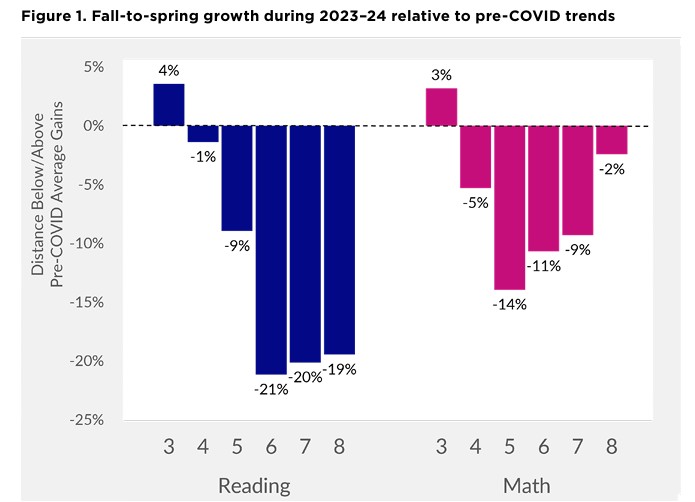Across the country, the newest national results show reading has slipped again—reaching or matching historic lows for many students. In 2024, both 4th- and 8th-grade NAEP reading scores declined from 2022, and about one-third of 8th graders performed below the “Basic” level, the highest share on record. Nations Report CardNational Assessment Governing Board
The same pattern shows up in college-entry testing. SAT averages fell again for the Class of 2024 (total mean 1024), and ACT’s national composite dipped to 19.4—continuing a multi-year slide. College Board NewsroomACT
And while overall scores are down, the gap between pre-pandemic and current performance actually widened last school year—by 36% in reading—which means struggling readers are falling further behind without targeted support. NWEA

Why this matters now
Strong reading and writing underpin every subject: history essays, science labs, word problems in math, and the communication skills colleges and employers expect. The research is also clear: writing boosts reading—explicit instruction in writing and frequent writing about what students read improve comprehension and fluency. Arizona State University
What actually works (evidence-based)
For reading (K–8):
For writing (all grades):
Give daily time to write with explicit instruction (planning, revising, sentence combining, mentor texts) and frequent feedback. Evidence-based recommendations from the U.S. Department of Education support this structure. Institute of Education Sciences
Use proven elements for older students: sentence combining, strategy instruction, summarization, collaborative writing, and setting product goals (from the landmark Writing Next meta-analysis). media.carnegie.org
A parent playbook you can start this week
Grades 3–5
10–15 minutes of decoding/fluency
Try short passages or poems. Echo read (you read a line, they reread), then one timed reread to build speed with accuracy.
Vocabulary with meaning, not memorization
Pick one Greek/Latin root (e.g., tele, bio) and make a 5-word mini-poster this week.
Write to read
After any chapter/article, have your child write a 4-sentence “Somebody–Wanted–But–So” summary—then revise one sentence for clarity or stronger verbs. (Writing builds comprehension.) Arizona State University
Grades 6–8
Argument habit
Once a week, choose a short article and have your child write a quick claim–evidence–reasoning paragraph. Aim for one quote or data point and one explanation sentence.
Sentence power-ups
Teach one combining move (because/which/—; appositive, participial phrase) and hunt for places to use it in their writing. This is a high-impact writing practice. media.carnegie.org
Fluency & knowledge
10 minutes of out-loud reading from content-rich texts (science/history). Alternate by paragraph.
Grades 9–11
Timed writing, light lift
Every other week, give a 20-minute rhetorical analysis or synthesis prompt. Focus feedback on one skill (thesis specificity, commentary depth, or organization).
Read like a writer
Choose one op-ed per week. Mark the claim, the strongest piece of evidence, and a rhetorical move (analogy, concession). Imitate the move in 3–4 original sentences.
College-entry readiness
If tests are in play, mix digital SAT/ACT-style reading sets and grammar/editing drills with your child’s course reading so practice transfers to schoolwork. (Score trends underscore the need for steady practice.) College Board NewsroomACT
How to spot a high-quality class or tutor
Ask whether they:
Screen for foundations (phonics/fluency for younger readers; vocabulary gaps and syntax for older) and reteach explicitly when needed. Institute of Education Sciences
Build knowledge through complex texts and discussion and teach strategies (summarizing, inference, text structure).
Provide weekly writing with revision, not just worksheets; use mentor models and sentence-combining practice. Institute of Education Sciencesmedia.carnegie.org
Share clear progress checks every 3–4 weeks (reading fluency, comprehension responses, and writing rubrics) so families see growth early
Boluo School provides high quality tutoring in ELA, Math and Science. Book a class this fall to make your child more academically sucessful!
Click link to see available group classes:
Group Lesson| Boluo Club